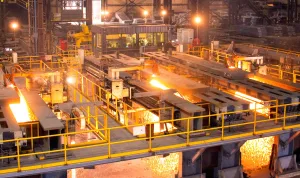Decoding the Metal Mystery: Unraveling the Key Differences Between Steel and Iron Blocks

What is the difference between steel and iron blocks?
In the realm of construction and manufacturing, the choice between steel and iron blocks can be a crucial decision with far-reaching implications. While these materials may seem similar at first glance, delving deeper reveals a world of disparities that can significantly impact performance, durability, and cost-effectiveness. So, what sets steel and iron blocks apart? Let’s embark on a journey of exploration to uncover the nuances of these two foundational metals.
1. Composition:
– Steel: A marvel of metallurgy, steel is an alloy composed primarily of iron and carbon, with additional elements such as manganese, silicon, and chromium. This amalgamation results in a material with exceptional strength, versatility, and resistance to corrosion.
– Iron: In its pure form, iron boasts remarkable strength and durability. However, iron blocks typically contain a higher percentage of impurities, which can render them more prone to rust and less resilient under stress compared to their steel counterparts.
2. Strength and Durability:
– Steel: Renowned for its superior tensile strength and toughness, steel blocks excel in demanding environments where structural integrity is paramount. Whether supporting skyscrapers or reinforcing bridges, steel’s formidable properties make it the preferred choice for projects requiring maximum resilience.
– Iron: While iron blocks possess commendable strength, they generally exhibit lower tensile strength and ductility compared to steel. Consequently, they may be more susceptible to fractures and deformation, particularly in applications subject to heavy loads or extreme conditions.
3. Corrosion Resistance:
– Steel: Through the strategic incorporation of alloying elements like chromium and nickel, stainless steel emerges as a stalwart defender against corrosion. This resistance to rust and oxidation makes steel blocks ideal for outdoor structures, marine environments, and industrial machinery exposed to moisture and corrosive substances.
– Iron: Traditional iron blocks lack the inherent corrosion resistance of steel, making them susceptible to rust when exposed to moisture or oxygen for prolonged periods. To mitigate this vulnerability, iron blocks may require additional coatings or treatments to safeguard against corrosion, adding to maintenance costs over time.
4. Cost Considerations:
– Steel: While steel’s exceptional properties command a higher initial cost compared to iron, its longevity and performance often justify the investment over the long term. Moreover, advancements in manufacturing processes and recycling technologies have made steel increasingly cost-effective and sustainable.
– Iron: Iron blocks typically offer a more budget-friendly alternative to steel upfront. However, factors such as maintenance expenses, replacement frequency, and potential downtime due to corrosion-related issues can contribute to higher overall costs in the long run.
In conclusion, the disparity between steel and iron blocks transcends mere material composition, encompassing strength, durability, corrosion resistance, and cost-effectiveness. While both metals serve as indispensable building blocks in various industries, understanding their distinctive characteristics is paramount in making informed decisions that optimize performance and longevity. Whether constructing towering edifices or crafting precision machinery, the choice between steel and iron ultimately hinges on striking a delicate balance between functionality, affordability, and resilience in the face of adversity.
With this comprehensive guide in hand, navigating the complex landscape of metal selection becomes a far more illuminating journey—one that empowers stakeholders to forge ahead with confidence and clarity.



